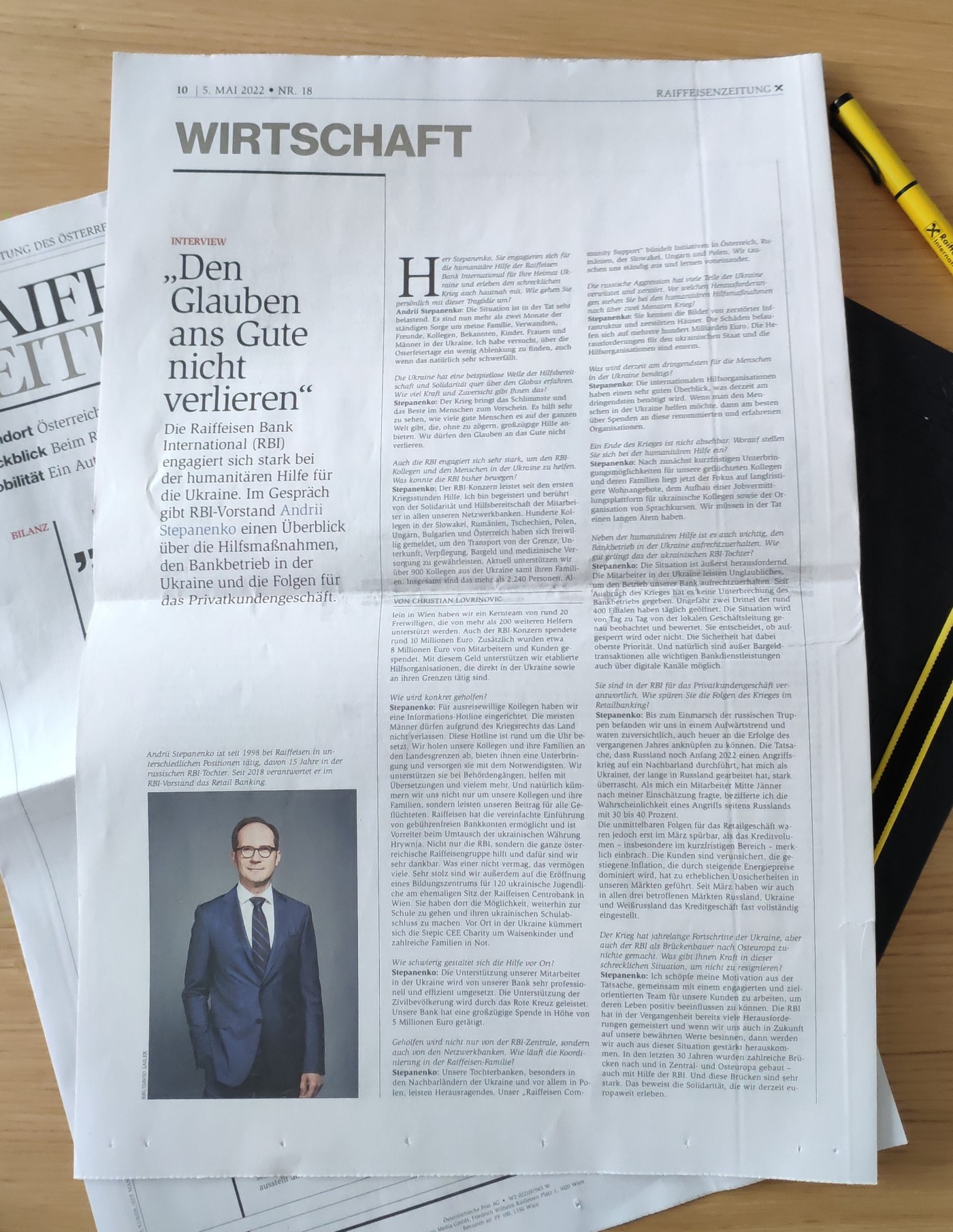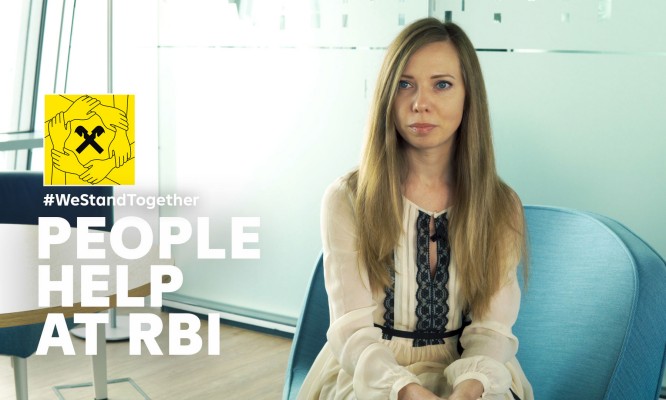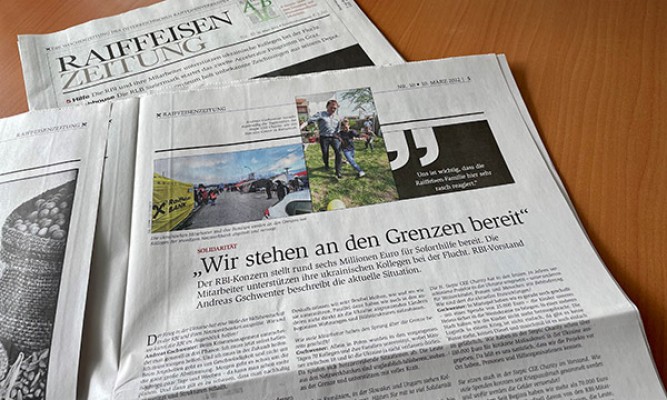"Raiffeisenzeitung" No. 18/2022 of 05.05.2022: Interview by CHRISTIAN LOVRINOVIC Interview with RBI Board Member Andrii Stepanenko
"Don't lose faith in the good"
Raiffeisen Bank International (RBI) is strongly committed to humanitarian aid for Ukraine. In an interview, RBI Board Member Andrii Stepanenko gives an overview of the aid measures, banking operations in Ukraine and the consequences for retail banking.
Lovrinovic: Mr Stepanenko, you are involved in Raiffeisen Bank International's humanitarian aid for your home country Ukraine and are also experiencing the terrible war at first hand. How do you personally deal with this tragedy?
Stepanenko: The situation is indeed very stressful. It is now more than two months of constant worry about my family, relatives, friends, colleagues, acquaintances, children, women and men in Ukraine. I tried to find a little distraction over the Easter holidays, even though it is of course very difficult.
Lovrinovic: Ukraine has experienced an unprecedented wave of helpfulness and solidarity across the globe. How much strength and confidence does that give you?
Stepanenko: War brings out the worst and the best in people. It helps a lot to see how many good people there are around the world who, without hesitation, offer generous help. We must not lose faith in the good.
Lovrinovic: RBI is also very committed to helping RBI colleagues and the people in Ukraine. What has RBI been able to achieve so far?
Stepanenko: The RBI Group has been providing aid since the first hours of the war. I am thrilled and touched by the solidarity and willingness to help shown by employees in all our network banks. Hundreds of colleagues in Slovakia, Romania, the Czech Republic, Poland, Hungary, Bulgaria and Austria have volunteered to provide transport from the border, accommodation, food, cash and medical care. We are currently supporting more than 900 colleagues from Ukraine together with their families. In total, that is more than 2,240 people. In Vienna alone, we have a core team of around 20 volunteers who are supported by more than 200 other helpers. The RBI Group also donated around 10 million euros. In addition, around € 8 million was donated by employees and customers. With this money, we support established aid organisations that are directly active in Ukraine as well as on its borders.
Lovrinovic: How is help provided in concrete terms?
Stepanenko: We have set up an information hotline for colleagues who want to leave. Most of the men are not allowed to leave the country because of martial law. This hotline is staffed around the clock. We pick up our colleagues and their families at the country's borders, offer them accommodation and provide them with the basic necessities. We support them in dealing with the authorities, help with translations and much more. And of course we don't just look after our colleagues and their families, but do our bit for all refugees. Raiffeisen has facilitated the introduction of fee-free bank accounts and is a pioneer in the exchange of the Ukrainian currency, the hryvnia. Not only RBI, but the entire Austrian Raiffeisen Group is helping and we are very grateful for that. What one cannot do, many can. We are also very proud of the opening of an education centre for 120 Ukrainian young people at the former headquarters of Raiffeisen Centrobank in Vienna. There, they have the opportunity to continue going to school and to obtain their Ukrainian school diploma. On site in Ukraine, the Stepic CEE Charity takes care of orphans and numerous families in need.
Lovrinovic: How difficult is it to provide help on the ground?
Stepanenko: The support of our employees in Ukraine is implemented very professionally and efficiently by our bank. Support for the civilian population is provided by the Red Cross. Our bank has made a generous donation of 5 million euros.
Lovrinovic: Help is provided not only by the RBI headquarters, but also by the network banks. How does the coordination work in the Raiffeisen family?
Stepanenko: Our subsidiary banks, especially in the neighbouring countries of Ukraine and above all in Poland, are doing an outstanding job. Our "Raiffeisen Community Support" bundles initiatives in Austria, Romania, Slovakia, Hungary and Poland. We are constantly exchanging ideas and learning from each other.
Lovrinovic: The Russian aggression has devastated and destroyed many parts of Ukraine. What challenges do you face in the humanitarian relief efforts after more than two months of war?
Stepanenko: You know the pictures of destroyed infrastructure and destroyed houses. The damage amounts to several hundred billion euros. The challenges for the Ukrainian state and aid organisations are enormous.
Lovrinovic: What is most urgently needed for the people in Ukraine at the moment?
Stepanenko: The international aid organisations have a very good overview of what is needed most urgently at the moment. If you want to help the people in Ukraine, the best way is to donate to these renowned and experienced organisations.
Lovrinovic: An end to the war is not in sight. What are you prepared for in terms of humanitarian aid?
Stepanenko: After initially providing short-term accommodation for our refugee colleagues and their families, the focus is now on more long-term housing offers, setting up a job placement platform for Ukrainian colleagues and organising language courses. We must indeed have stamina.
Lovrinovic: In addition to humanitarian aid, it is also important to maintain banking operations in Ukraine. How well is the Ukrainian RBI subsidiary doing that?
Stepanenko: The situation is extremely challenging. The employees in Ukraine are doing incredible things to keep our bank running. Since the outbreak of the war, there has been no interruption in banking operations. About two thirds of the approximately 400 branches are open every day. The situation is closely monitored and assessed from day to day by the local management. They decide whether to open or not. Security has top priority. And of course, apart from cash transactions, all important banking services are also possible via digital channels.
Lovrinovic: You are responsible for retail banking at RBI. How do you feel the consequences of the war in retail banking?
Stepanenko: Until the invasion of the Russian troops, we were in an upward trend and were confident that we would be able to build on last year's successes this year as well. The fact that Russia is still waging a war of aggression on a neighbouring country at the beginning of 2022 came as a great surprise to me as a Ukrainian who has worked in Russia for a long time. When an employee asked me for my assessment in mid-January, I put the probability of an attack by Russia at 30 to 40 per cent. However, the immediate consequences for the retail business were not felt until March, when the credit volume - especially in the short-term sector - plummeted noticeably. Customers are unsettled; the increased inflation, dominated by rising energy prices, has led to considerable uncertainty in our markets. Since March, we have also almost completely stopped lending in all three affected markets, Russia, Ukraine and Belarus.
Lovrinovic: The war has undone years of progress made by Ukraine, but also by RBI as a bridge builder to Eastern Europe. What gives you strength in this terrible situation not to resign?
Stepanenko: I draw my motivation from the fact that I work together with a committed and goal-oriented team for our customers to be able to positively influence their lives. RBI has already mastered many challenges in the past and if we continue to remember our proven values in the future, we will also come out of this situation stronger. Over the past 30 years, numerous bridges have been built to and in Central and Eastern Europe - also with the help of RBI. And these bridges are very strong. This is proven by the solidarity that we are currently experiencing throughout Europe.






